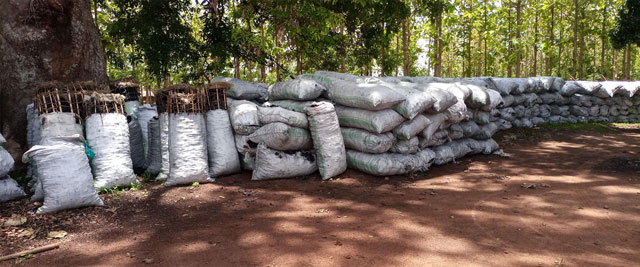
Gulu, Uganda | THE INDEPENDENT | Charcoal dealers have cleared thousands of shea nut tree acreages in Acholi Sub Region.
The dealers have over the years spread out in Gulu, Amuru, Agago, Kitgum, Lamwo and Pader districts where they have massively cut down several acres of shea nut trees for charcoal.
The areas were once densely populated with shea nut trees, an indigenous tree species which were preserved by the Acholi inhabitants for ritual purposes, medicinal values, food and body ointments. However most of the places currently have very few or none of the Shea nut trees because they have been cleared for charcoal businesses.
In Okidi North and East Villages in Attiak Sub County in Amuru district, more than 100 acres of Shea nut trees have been cut down by the charcoal dealers.
The trees regardless of their sizes have been razed to the ground using power saws by people believed to come from the Central and Eastern parts of the country.
Michael Lakony, the Amuru LCV Chairperson says that the charcoal dealers target the shea nut trees among other indigenous trees including mahogany and Afzelia Africana for charcoal burning.
He explained that much as the district local government passed a by-law banning the illicit trade since 2016, containing the business has remained challenging as community members allow the illegal dealers to invade their areas without reporting to authorities.
In Adilang Sub County, Agago district more than 100 acres of shea nut trees among other indigenous tree species have also been destroyed for charcoal in the last two years.
Andrew Onyuk, the Agago Resident District Commissioner says that the dealers who reportedly have no authorization from the forest department have embarked on the massive business with assistance from members of the community.
In Gulu district, Omel, Paibona and Palaro Sub Counties have as well registered extensive destruction of shea nut trees estimated at over 200 square miles.
Richard Watmon, the Paibona Sub County Chairperson says that his council is incapacitated to curb the vice due to inadequate manpower to effect operations as well as resistance from members of the community who receive tokens from the charcoal dealers.
He added that more than five trucks loaded with charcoal leaves the area daily, Watmon instead faulted the National Forestry Authority (NFA) over failure to avert the looming destruction of the endangered tree species and forest cover in the Northern Region.
Also in Adilang Sub County Lamwo district, the NFA says that over 30 square miles of shea nut trees have been cut down for charcoal businesses.
Research by ‘’ Our Trees We Need Answers’’, an environmental pressure group in Northern Uganda points out that the commercial charcoal dealers are from as far as Nakasongola, Luweero, Iganga, Mukono, Mbale and Soroti districts among others.
Arthur Owor, a director at the Center for African Research in Gulu says that the level of forest destruction in the Northern Region is alarming and requires urgent intervention from the government and all stakeholders.
Abraham Odur, the Forest Supervisor for Aswa River Range comprising Acholi and Lango Regions instead faulted members of the community and local leaders for allowing foreigners to intrude in their areas to cut trees in return for meagre pays.
He also urged the government to invent an alternative source of fuel since the majority of the people depend on charcoal for cooking and other domestic uses.
Jimmy Ouna, the NFA Range Manager for Aswa has also rooted in the need for massive sensitization to create awareness on the importance of indigenous trees and the dangers of tree cutting.
Xavier Ssekanabo, an officer from the Environmental Police Protection Unit told URN that they recently launched an operation in the area and arrested more than 100 people found cutting down the endangered tree species for charcoal purposes.
He however explained that containing the illicit business is challenging due to the lack of cooperation from the local government who look at it as an alternative source of revenues.
*******
URN
 The Independent Uganda: You get the Truth we Pay the Price
The Independent Uganda: You get the Truth we Pay the Price



